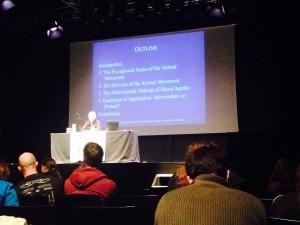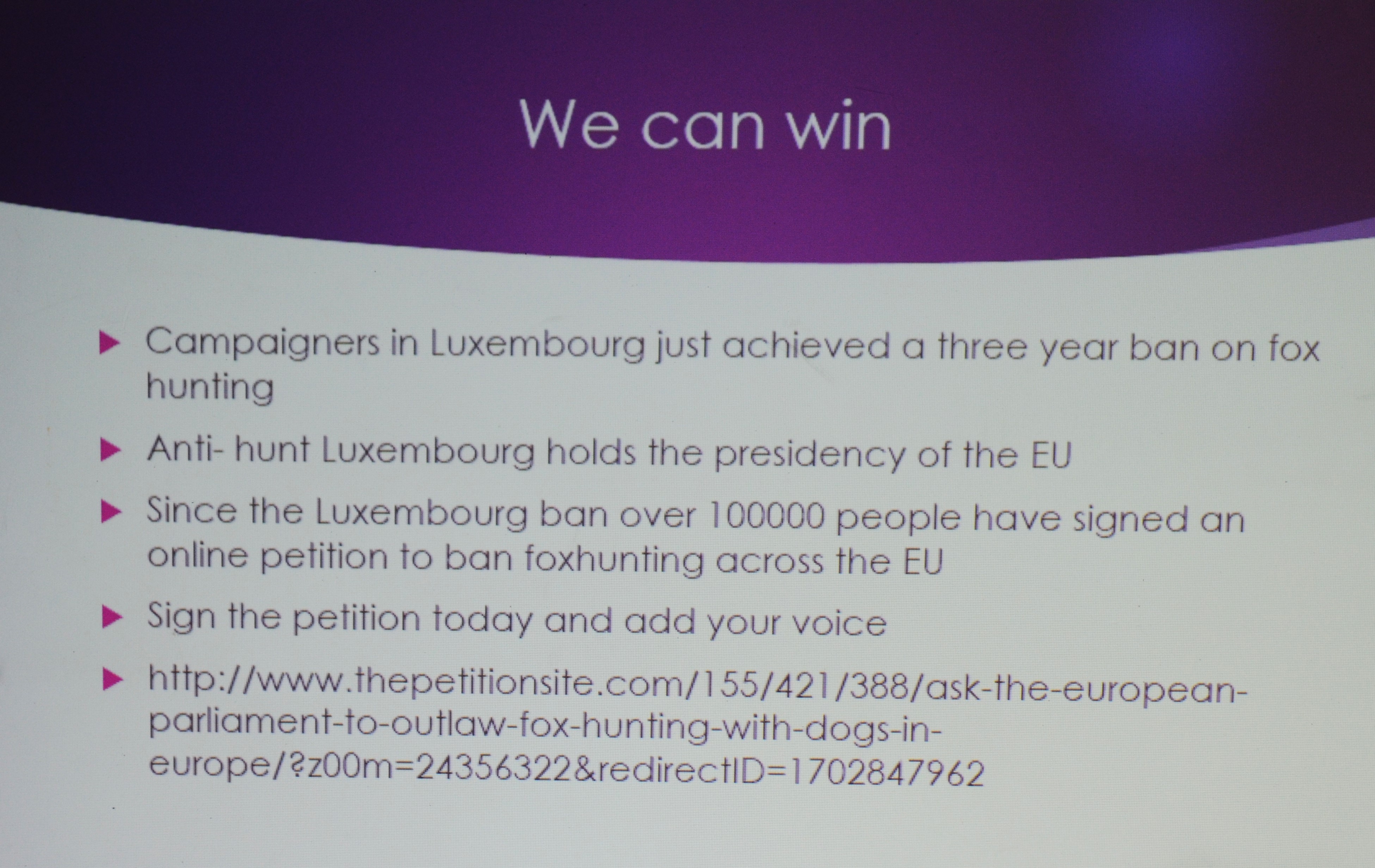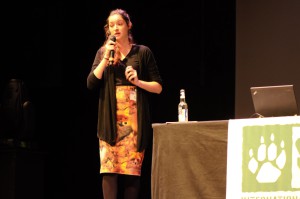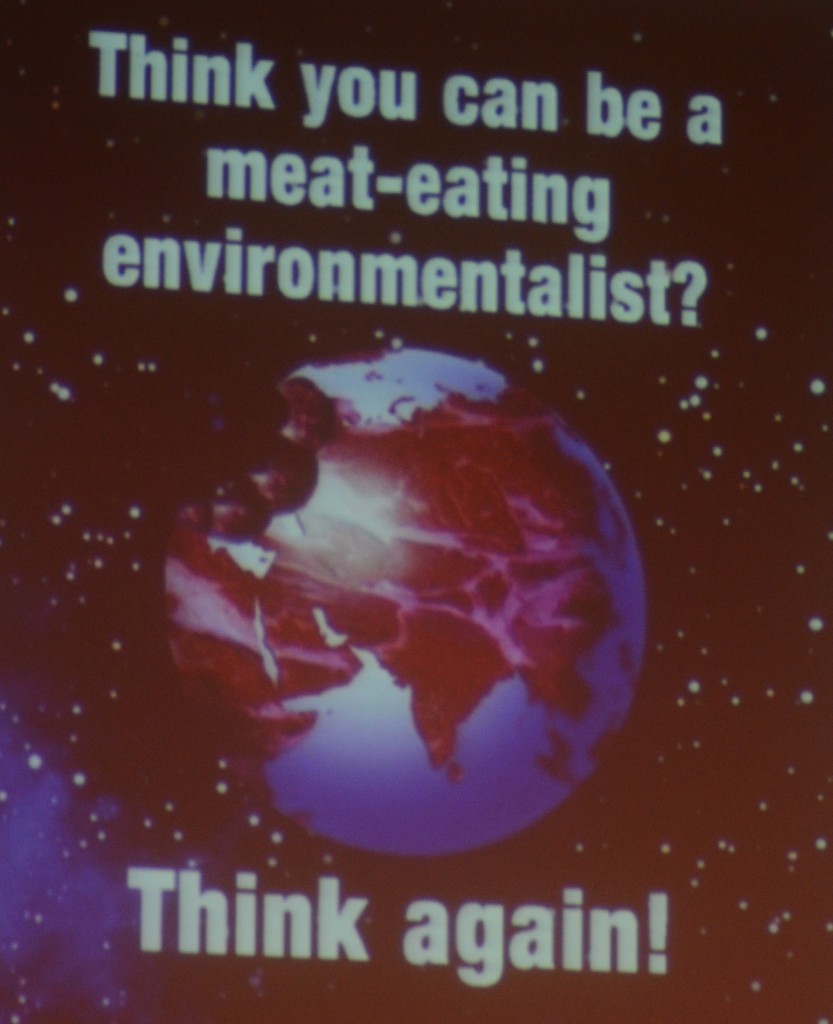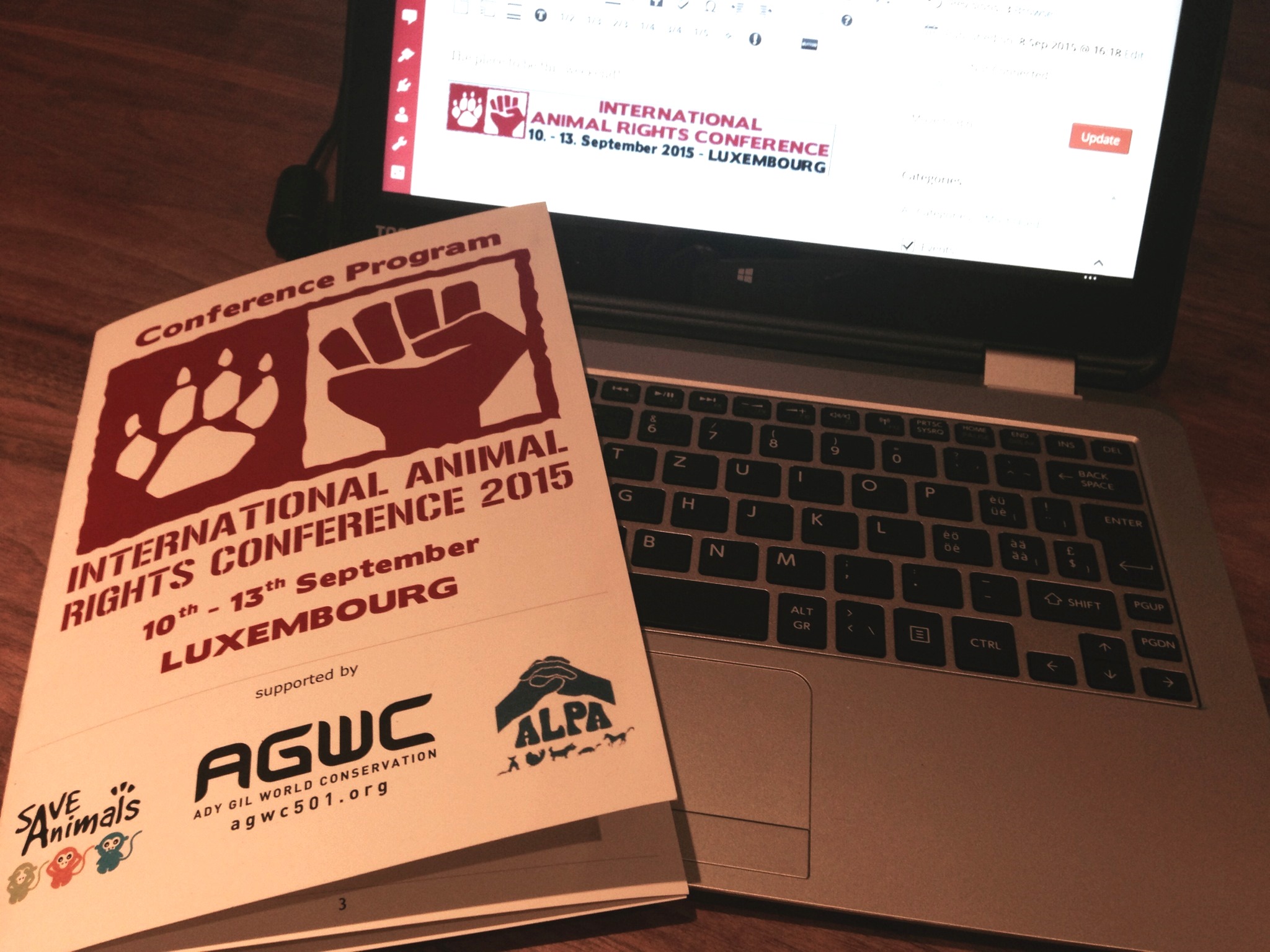
International Animal Rights Conference 2015 – abolitionism versus welfare, pragmatism versus ideology, vegan versus ‘veggie’. The many faces of the AR movement.
Day 1: Factual information isn’t enough. Let’s touch hearts and minds!
Friendly like-minded people from all over the world, passionate speakers, free running dogs, yummy food – that’s what made me look very much forward to the annual International Animal Rights Conference, hosted in the Kulturfabrik (a former slaughterhouse!) in Esch-sur-Alzette in Luxembourg the weekend of 10-13 September 2015.
I managed to be there for the last two presentations in which both Jens Tuider and Elisa Aaltola stressed that rational arguments are not enough to change people’s minds on animal exploitation and that we need to look for different angles in communication campaigns that are able to touch people in a deeper way.
In his presentation on how to bring animal rights theory down to earth, Jens Tuider noted that all the information about the suffering of animals is right here, at our fingertips, and yet people continue to eat animals. Tuider said that we need “new and different forms of persuasion” to bring change and deplored that there wasn’t enough research on why people behave like they do. “We need less armchair philosophy and speculation and more empirical psychological and social research”, he claimed. Many social psychologists indeed still seemed to consider moral agents as rational beings, and thus underestimate the role of emotions and intuition. As it becomes more and more clear that good arguments don’t automatically lead to an end of animal exploitation, one should not be afraid to rely more on emotional arguments. Jens Tuider was convinced that this will not damage the animal rights (AR) movement or make it seem less serious. Put into practice, this could mean that campaigns depict the lives and misery of individual animals, and do not hide any longer this truth behind statistics or the representation of the misery of a whole species. People care more about the faith of an individual animal, which has a name, a personality, than about an abstract reality. Tuider rightly noted that people really started to care for the migrants and refugees’s cause after they had been touched by the picture of the drowned refugee Aylan, even if all the facts about the refugee crisis were there way earlier.
The speaker claimed that, at the end of the day, “every argument is right which helps to make the world a better place”. Awareness-raising actions should not, for some kind of “ideological purity” that puts the lives of the animals first, neglect health-related or environment-related arguments for veganism if they work, and if they make people think about their way of consuming animals. For the question about ethical trade-offs, and the question if an association promoting vegetarianism should promote vegetarian products manufactured by a meat company, read this article about an incident that happened at the conference.
The next speaker, Elisa Aaltola, elaborated on the paradox that both the love AND the exploitation of animals are nowadays increasing and she deplored, like the previous speaker, that rational arguments seem to fail to bring change.
Cognitive dissonance, denial, the supposed physiological need for meat and the underestimation of the capabilities of animal cognition explain this paradox, according to Aaltola.
She then however adopted a very different approach than Tuider. Going back to Sokrates, Spinoza and Descartes, she appealed to our common obligation for “moral cultivation”. “Life is a constant moral struggle”, she said, and we should not just boldly accept ourselves as we are. Therefore, we need to reject emotions like greed, our sense of human superiority or “culinary hedonism”, and we need to constantly critically reflect on our emotions and perceived needs. This should not be an individual process only. Our consumerist and anthropocentric society, and especially law, education, market relations, need to change, too. Meat consumption should not only be a matter of personal decision making.
Very interestingly, she also pointed out that an ethically correct life is often perceived as a sacrifice instead of the enriching experience that it can be and therefore she said that campaigns need to focus more on the positive side, on the joy and generosity generated by a ‘good’ life. Good point!
I couldn’t be there for Sharon Nunez’ talk on ‘Doing the most good‘, but you can check it out on Youtube.
Neither did I cover Friday’s sessions but you can watch the following presentations on Youtube:
- Making compassion easier: a strategy for achieving vegan critical mass (Tobias Leenaert)
- All the benefits of veganism (Stijn Bruers)
- Total liberation workshop (Aga Trzak)
- Farmed animals: the hidden thruth and how to bring their stories (Melanie Jacques)
- Active for animals: new online tools to manage your street events (Peter Ronsby)
- Effective ways to promote veganism (Sebastian Zösch)
Day 3: Angry or kind?
 On Saturday, Josh Harper called for a change of the aesthetics and of the rhetoric of the movement and of direct action. “There should be less militant fight and more kindness in the movement” in order to convince more people to join and dedicate themselves to the cause. (In contrast, another speaker, Friedrich Mülln, said in his talk: “Be an angry vegan – it’s the angry people that change the world!”) He added that the movement should be less self-centered and that it should concentrate, in the first place, on the animals and the conditions they are living in and less on the activists themselves (cf. the discussion on ‘ideological purity’ above…). Finally, he pointed out that the movement should not only consider the problem of slaughterhouses, fur farms etc but that it should broaden its view on the general organisation of our society and its priorities, which implicitly support animal exploitation.
On Saturday, Josh Harper called for a change of the aesthetics and of the rhetoric of the movement and of direct action. “There should be less militant fight and more kindness in the movement” in order to convince more people to join and dedicate themselves to the cause. (In contrast, another speaker, Friedrich Mülln, said in his talk: “Be an angry vegan – it’s the angry people that change the world!”) He added that the movement should be less self-centered and that it should concentrate, in the first place, on the animals and the conditions they are living in and less on the activists themselves (cf. the discussion on ‘ideological purity’ above…). Finally, he pointed out that the movement should not only consider the problem of slaughterhouses, fur farms etc but that it should broaden its view on the general organisation of our society and its priorities, which implicitly support animal exploitation.
In the next talk, Alfie Moon gave a very interesting overview on hunting and sabbing in Europe and I was happy to see that he took the situation in Luxembourg into account. Have a look at this slide:
Isn’t this exciting – Luxembourg as a pioneer for a foxhunting ban?!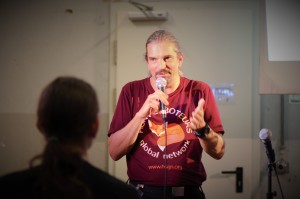
According to his statistics, there are only 0,4% of people that go hunting in Luxembourg and Luxembourg was even mentioned in a slide with the title “the good countries”. (The European average is 1,34%, with Ireland being at the top with 8% of hunters in the population.)
Another highlight of that day was Dr. Melanie Joy‘s presentation on the challenges of activism. She described how hard it is to live in a speciest, meat-eating word that conforms to a very violent norm, to see corpses where other people see ‘cuisine’,… She then called for more compassion towards non-vegans and said that “there are good people that eat animals, and this doesn’t make them bad people. We need to separate character from behavior.” (Good to be reminded of this!). Finally, she emphasized that activists need to look after themselves to be long-term efficient and said that “Activists are animals, too, that deserve a happy life!”. Isn’t she great?!!
Day 4: Some more introspection
On Sunday, I listened to Manon Dené‘s talk about the politization of the animal rights movement. Take the agrobusiness being the first sector in terms of revenues in France, the Prime minister, the minister for Environment and the minister for Agriculture apparently being active hunters, and add a lack of professional lobbyists for the animals’ cause and you understand the failure to politizise the issue. (I loved her skirt with the foxes on it!)
I looked forward with a lot of curiosity to the presentation with the title What if plants were sentient? Good question…Alain de Coessemaeker reminded us that not such a long time ago, science thought that fish were non sentient, which now proves to be wrong. He showed several examples of how plants are able to sense the world around them. Did you know that they can see, smell, hear, communicate, feel and even have some kind of memory? They have more photoreceptors than humans and are genetically more complex than animals. Have a look at the lectures of Prof. Chamowitz to find out more about plant neurobiology. The conclusion of this session was that every creature, every life form, should be respected in its intrinsic value and that we should widen our sense of compassion to other life forms. As the meat industry is responsible for 70% of the destruction of the rain forest, a vegan diet paradoxically can lead to the preservation of plants.
The last presentation of the conference was another critical reflection on the AR movement and its relations with other social justice movements and other causes. Jake Conroy also called for more compassion and a less judgmental attitude towards non-vegans. He said that AR organisations should join forces with their closest ally – the environmental organisations because:


